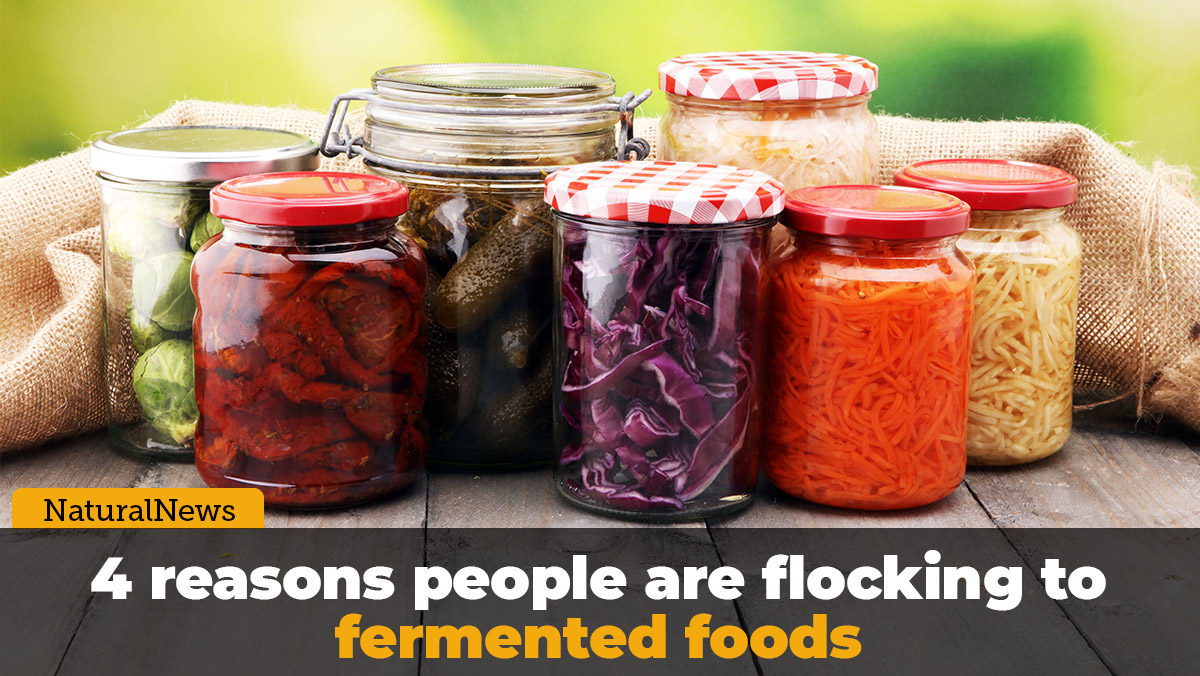4 reasons people are flocking to fermented foods
04/18/2018 / By Derek Henry

There have been many trends through the years for health enthusiasts, and although many of these ideas are half-baked, every once in a while one comes along that has some teeth to it and can actually legitimately change a person’s life.
Fermented foods, or perhaps more accurately, cultured foods, are one of those rare trends that can create a new level of health for those that actively integrate it into their lives. Fortunately, this doesn’t have to mean spending hours in the kitchen every week (but if you enjoy that, you certainly could) to get the benefits of cultured foods.
So why are cultured foods growing in popularity, and why might you want to consider them closely? There are primarily four reasons.
Probiotic powerhouses
There used to be a time when you could get a decent dose of probiotics from food grown in clean, nutrient dense soil, but after decades of poisoning and strip mining agricultural land, then treating our fruits and vegetables to bleach baths and the like, those soil based organisms are as rare as a one-faced politician.
The good news is this forced us to find another way and we can now access even greater amounts and strains of probiotics through properly cultured foods. Since these good bacteria are essential to the health of the human microbiome (digestive system), and can translate to increased support for nutrient absorption, gut motility and immunity, you may want to consider getting them into your body every single day.
Live enzymes
When you consume raw (unpasteurized) cultured foods, you get a litany of living enzymes that are ready to go to work to break down carbohydrates, fats, and protein. Not only that, enzymes are crucial to make any chemical reaction happen inside the body, so the health of all your organs and glands depends on adequate enzyme reserves for optimal function. [For more ways to increase your longevity, visit Longevity.news.]
Since the consumption of raw food is very limited in most diets, and enzyme reserves naturally wane as we get older, the introduction of enzyme rich cultured foods is a great way to keep up your enzyme stock to support all areas of your body and body functions.
Bioavailable nutrients
Ever wonder why many members of the animal kingdom chew up their food, then regurgitate it for their babies to eat? Simply speaking, they are breaking down the food to make it more bioavailable and digestible to their young. This is the same type of idea that applies when you culture foods and consume them.
When you culture foods, you allow them to be exposed to gut friendly bacteria, which break down the structure of the food into more digestible components. This makes it much easier for uptake of various nutrients, and puts much less stress on the digestive system.
In the case of popular cultured vegetables, the spectrum of nutrients you could expect to absorb includes vitamins B1, B6, B9, C, K and minerals such as manganese, calcium, potassium, magnesium, phosphorus, and iron.
Digestive support
The calling card of properly cultured foods is excellent digestive support. With the powerful combination of probiotics and enzymes as well as synergistic nutrients, taking just a few ounces a day of a cultured food or beverage can engineer some remarkable health benefits. Considering that enzymes, probiotics, vitamins, minerals, and water are all key agents in the digestive process, it’s no wonder why probiotic rich foods are so important for digestive health.
One thing to keep in mind while consuming cultured foods is that digestive complaints like gas and bloating can occur if die-off of harmful pathogens takes place. Keep this in mind prior to consuming fermented foods, start with small amounts, and consult a health professional if necessary.

Popular cultured foods and easily integrated sources
There are many choices these days to access cultured foods and beverages, as the trend is hot and companies are anxious to jump on the probiotic bandwagon.
One of the most popular fermented products is sauerkraut, which consists primarily of cabbage and other root vegetables and has an insane probiotic count – 4 to 6 ounces can deliver up to 10 trillion live bacteria! Of course, there is no limit on creativity when it comes to culturing foods, so long as you chop them up nicely and create an environment that allows culturing to effectively take place. If you need some direction, try out this homemade sauerkraut recipe.
Of course, sauerkraut is only one of a handful of popular sources of probiotic goodness. For other popular sources, check out these seven probiotic rich foods.
As I’m sure you can appreciate, not all fermented foods contain these benefits (ie. wine, beer), and not all are clean and contain a wide variety of nutrients. So if you want to make sure you can easily access fermented foods and do so on a daily basis to encourage better health, check out the Health Ranger’s Fermented Super30, a fermented superfood powder with 30 different food sources, all lab-tested to ensure purity.
See all the ingredients of the Health Ranger’s Fermented Super30, here.
Now go ahead and get fermented, so you can enjoy the health benefits of a trend that’s proven it’s worth for centuries.
Sources for this article include:
Submit a correction >>
Tagged Under:
This article may contain statements that reflect the opinion of the author
RECENT NEWS & ARTICLES
COPYRIGHT © 2017 SUPER FOODS NEWS





















